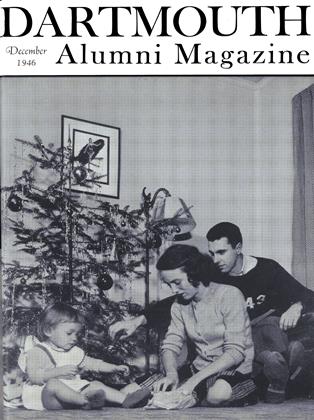THE NATIONAL CHARACTER of the student body which assembles in Hanover each year has, with justification, been a cause for both pride and satisfaction to the College and all Dartmouth men. The Selective Process of Admission which fosters this geographical distribution has now been in operation for exactly twenty-five years. Even before its adoption in 1921, Dartmouth undergraduates were drawn from as many as forty states, but what can be claimed for the Selective Process is that it strengthened and stated as definite College policy an enrollment trend that began immediately after World War I.
Student representation from all 48 states prevailed through most of the 30's, and in this first "normal" year of the postwar period the Registrar's report on geographical distribution lists 44 states, as well as the District of Columbia and thirteen foreign lands. On the surface this seents like a very satisfying spread, but a closer look at the report shows that four states have but a single representative, four more states have but two, and fourteen states in all have less than five representatives. Missing entirely from the list at present are Arkansas, Idaho, Mississippi and Montana. All of which means that in a record-breaking student body of more than 2800 men, only thirty states have what might be called a solid representation.
Dartmouth graduates of recent decades will attest to the increased value which was given to their college education by the chance to live with other young men from all sections of the country. Dartmouth must continue to guard zealously this asset of its national character, and the latest report on geographical distribution ought to be pondered by all alumni as well as by officers of the College. While the academic quality and national prestige of the College must remain the primary reason for young men's wanting to come to Hanover, there is a great deal that alumni, individually or through group effort, can do to stimulate interest among qualified and promising youths, especially in those parts of the United States where Dartmouth's student representation is thinnest.
President Dickey's current tour to the Far West and South West has been arranged in order to bring Dartmouth's new leader into personal touch with the alumni of those sections, but it is to be hoped that his visits to eight different states will serve also to strengthen the activity of alumni groups far from Hanover and to make those parts of the country more Dartmouth-minded. The President's alumni itinerary could easily have been planned to cover states and cities where Dartmouth men are more thickly settled, and it is expected that he will in time make those visits too, but from the point of view of putting the College's very best foot forward in parts of the country from which more applicants would be welcomed, the present tour could scarcely be bettered.
A new and as yet indefinite factor in the admissions picture is the College's participation in the peacetime Naval Reserve Officers Training Corps program. According to the Holloway Plan, which has become law and will be put into full effect next fall, as many as a hundred carefully chosen young men from all parts of the country may be sent to Dartmouth as civilian freshmen each year. With the government paying all basic costs of a college education and providing a monthly retainer of $50 besides, the NROTC program offers what is in effect a large number of national scholarships to highly qualified young men. Those who are interested in Dartmouth and who, as required, gain admission to Dartmouth independently of their candidacy for enrollment in NROTC, may add to our representation from the more distant geographical areas as well as from the group of outstanding candidates of limited financial means, making them doubly welcome. This program holds some promise for the future, but it cannot be the real and lasting answer to the preservation and enhancement of Dartmouth's national character. That answer must come, as is true in so many other phases of Dartmouth life, from an intelligent and hard-working partnership between the College and its alumni.
 View Full Issue
View Full Issue
More From This Issue
-
 Article
ArticleHOPKINS CENTER
December 1946 By SIDNEY C. HAYWARD '26 -
 Article
ArticleON THE HILL
December 1946 -
 Class Notes
Class Notes1918
December 1946 By ERNEST H. EARLEY, DONALD L. BARR -
 Class Notes
Class Notes1928
December 1946 By OSMUN SKINNER, RUPERT C. THOMPSON JR. -
 Class Notes
Class Notes1919
December 1946 By J. KENNETH HUNTINGTON, MAX A. NORTON -
 Class Notes
Class Notes1917
December 1946 By MOTT D. BROWN, DONALD BROOKS













